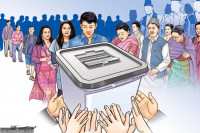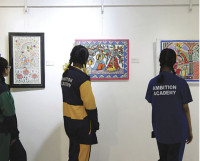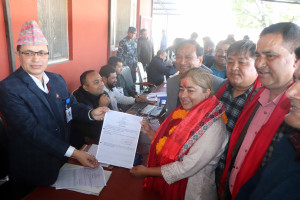Opinion
Time to grow
Nepal needs to manage its resources and prioritise its goals to achieve sustainable development
Yuba Raj Guragain
Nepal’s new constitution is in line with the Sustainable Development Goals (SDGs), contained in paragraph 51 United Nations Resolution A/RES/70/1 of 25 September 2015, that are to be implemented and achieved during the period of 2015 to 2030. Thus, we do not need to worry about adopting the SDGs in the national policy level but need to focus on how to enhance self-sufficiency and prioritise the 17 goals and 169 targets mentioned in the SDGs. For this, examining the ground realities with adequate analysis is a key to plan, perform and succeed.
Two-thirds of the total population of Nepal rely on agriculture for livelihood. Still, two-thirds of the total agricultural products are imported for consumption. Our membership in the World Trade Organisation has lost its meaning, as the country has not been able to produce and export and seems to be getting increasingly dependent on imports over the years. Most of the youths have left the country for studying or working, whereas those who remain in the country are busy playing with smartphones while arable lands are left barren. Vehicles do not carry locally produced goods as much as they carry imported cold drinks. Actually, the market has curtailed our rights to freedom of selection. People do not consume locally produced goods, as they have to buy whatever the market provides them. But blaming the market entirely might not be fair. The focus of the state has been on service and social sector, while production and manufacturing activities have been sidelined. Because of this, locally produced goods are either unavailable or not up to the mark. It is high time the government started focusing on sustainable resource mobilisation, production and growth.
Required attention
Constitution of Nepal, under the directive principles of the state, Article 50, states that building a self-reliant and independent economy is the economic objective of the state, while building a civilised and egalitarian society is the socio-cultural objective of the state. While implementing the Millennium Development Goals, the country did well in social sectors such as health, education, sanitation, gender equality, child mortality, among others, in comparison to the economic sector. Thus, we now need to focus on the economic sector to achieve development. Having healthy and educated people will not mean a great deal if they do not produce or contribute to national development.
Though all the goals and targets of the SDGs are for the overall sustainable development of a country, examining the national needs and current development realities is important. Thus, our priority has to be on ending poverty (goal 1), sustainable agriculture (goal 2), sustainable water management (goal 6), access to sustainable modern energy (goal 7), sustained, inclusive and sustainable economic growth with productive employment (goal 8), resilient infrastructure and sustainable industrialisation (goal 9) and effective, accountable and inclusive institutions (goal 16).
Within these areas of priority, two goals, namely sustainable use and management of water resources and effective and accountable institutions, have to come first because water management and public institutions are the key to all development activities. By ensuring the best and sustainable use of water resources, almost all other development sectors such as health, education, irrigation, agriculture and industrial production can be enhanced. And by making public institutions effective and accountable, all the development activities can be managed effectively and efficiently.
Means of implementation
SDGs are more implementable than the Millennium Development Goals for SDGs have also devised some techniques for the means of implementation: mobilization of domestic resource, official development assistance, North-South, South-South and triangular cooperation, technology bank, increasing exports and so on along with provisions for follow up and review. However, given our current domestic production and geopolitics, we need to focus on resource mobilisation which is available in the form of natural capital, human capital, and socio-cultural capital. Money is not our problem; managing it is. For example, to buy shares, people are applying with more than the estimated and required amount in initial public offerings of companies. So to achieve prosperity-oriented and self-reliant development as envisioned by the SDGs by 2030, we need to manage our resources and prioritise
our goals.
Guragain is Section Officer at Election Commission




 9.12°C Kathmandu
9.12°C Kathmandu










